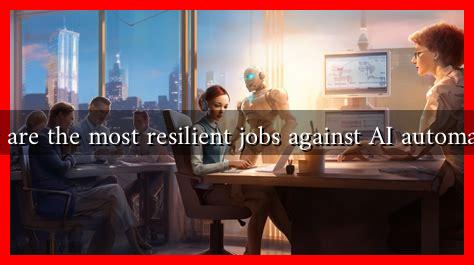-
Table of Contents
What are the Most Resilient Jobs Against AI Automation?
As artificial intelligence (AI) continues to evolve and permeate various sectors, the fear of job displacement looms large. However, not all professions are equally vulnerable to automation. Some jobs are more resilient due to their inherent complexity, the need for human interaction, and the requirement for creative problem-solving. This article explores the most resilient jobs against AI automation, providing insights into why these roles are likely to endure in the face of technological advancement.
The Nature of Resilient Jobs
Resilient jobs typically share certain characteristics that make them less susceptible to automation:
- Human Interaction: Jobs that require empathy, emotional intelligence, and interpersonal skills are less likely to be automated.
- Complex Problem-Solving: Roles that involve critical thinking and complex decision-making are challenging for AI to replicate.
- Creativity: Professions that rely on creativity and innovation are inherently human traits that AI struggles to mimic.
- Physical Dexterity: Jobs requiring fine motor skills and adaptability in unpredictable environments are difficult for robots to perform.
Top Resilient Jobs Against AI Automation
Here are some of the most resilient jobs that are likely to withstand the wave of AI automation:
1. Healthcare Professionals
Healthcare roles, such as doctors, nurses, and therapists, are among the most resilient against AI automation. These professions require a high degree of human interaction, empathy, and ethical decision-making. For instance, while AI can assist in diagnostics and data analysis, the nuanced understanding of patient care and emotional support remains a distinctly human domain.
2. Creative Professionals
Jobs in the creative sector, including artists, writers, and designers, are also less likely to be automated. Creativity involves not just the generation of ideas but also the ability to connect with audiences on an emotional level. For example, while AI can generate text or art, it lacks the personal experiences and cultural context that inform human creativity.
3. Skilled Tradespeople
Skilled trades such as electricians, plumbers, and carpenters require physical dexterity and problem-solving skills in unpredictable environments. These jobs often involve complex tasks that require adaptability and hands-on expertise, making them difficult for robots to replicate. According to the U.S. Bureau of Labor Statistics, demand for skilled trades is expected to grow significantly in the coming years.
4. Educators
Teachers and educators play a crucial role in shaping future generations. While AI can provide educational tools and resources, the mentorship, motivation, and emotional support that teachers offer cannot be replaced. The ability to inspire and connect with students on a personal level is a uniquely human trait that remains essential in education.
5. Mental Health Professionals
Psychologists, counselors, and social workers are vital in addressing mental health issues. These roles require deep empathy, active listening, and the ability to navigate complex emotional landscapes. While AI can assist in data analysis and provide resources, the therapeutic relationship built between a mental health professional and their client is irreplaceable.
Case Studies and Statistics
According to a report by McKinsey, approximately 60% of jobs could be automated by 2030, but only a fraction of those roles will be fully replaced. The report emphasizes that jobs requiring social and emotional skills, creativity, and complex problem-solving are less likely to be automated. For instance, the demand for healthcare professionals is projected to grow by 15% from 2019 to 2029, significantly outpacing the average for all occupations.
Conclusion
As AI continues to advance, it is crucial to recognize that not all jobs are equally at risk of automation. Professions that require human interaction, creativity, and complex problem-solving are likely to remain resilient. Healthcare professionals, creative roles, skilled tradespeople, educators, and mental health professionals exemplify the types of jobs that will endure in an increasingly automated world. By focusing on developing skills that complement AI rather than compete with it, individuals can better prepare for the future job market.
For more insights on the impact of AI on the job market, you can visit McKinsey & Company.


